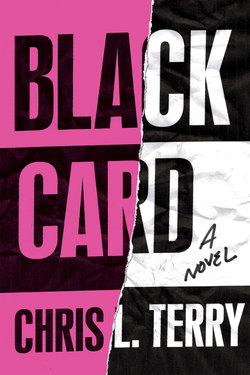Читать книгу Black Card - Chris L Terry - Страница 20
На сайте Литреса книга снята с продажи.
ОглавлениеTWO
We lived in the DC suburbs and, at my white school, the fourth-grade-boy Mount Rushmore was Bart Simpson’s serrated paper bag head and the five long-haired, cigarette-smoking skulls from the Guns N’ Roses logo. My mom was cool enough to buy me T-shirts of both, and I’d wear them on special occasions, like when we drove the half hour to dinner at Dad’s childhood friend Kenny’s apartment.
I liked Kenny’s living room because I could look out the balcony door and see a parkway, with tall trees waving in the glow of passing headlights. I imagined every car going somewhere interesting. That didn’t happen at home, where I’d kneel backwards on the couch, peering out the window and counting the times one of the neighborhood dads jogged around the block, grinning and waving as he passed.
When we’d come off the elevator for our last visit, we’d found Kenny clutching a frosty beer glass in his building’s carpeted hallway. He’d grinned and shouted, “No niggers allowed!” at my dad, who folded into a convulsive laugh I’d never seen him do.
The elevator door slid shut behind us. Mom’s mouth was a circle and she rotated her wrists, trying to decide if she should cover my ears or her mouth or Kenny’s. I knew that “nigger” was the worst bad word, but had never heard someone say it before that night. When Kenny’s eyes slid to my mom, his grin turned embarrassed and he said, “I’m sorry, y’all come on in.”
Kenny’s daughter, Jada, and I had an easy friendship that we’d renew at the kids’ table over our hatred of greens, but it felt different now that I was ten and the word “girl” had a capital G. Over the past year, I’d heard the n-word in a couple of rap songs and wondered if Kenny would make Dad laugh like that again, but the hall was empty when we arrived. In their apartment, Mom went into the kitchen, wine bottle first, and started laughing with Jada’s mom, Pam. Dad and I followed Kenny to the living room, where he stood in front of the balcony door, his hand on the back of a chair, and gave me the standard “You got so big!” treatment that’s so hard to respond to.
That year, my hands and feet felt huge and I didn’t know where to put them, so I smiled sheepishly. Then Kenny squinted at my T-shirt, seeing the Guns N’ Roses skulls at the tips of an ornate cross, with the redheaded singer at the crux, and asked, “What’s this? The, uh, Grateful Dead?” as if remembering a phrase from another language.
“No, Guns N’ Roses,” I said, incredulous.
“Sorry, I don’t know much rock ’n’ roll,” he said.
“It’s awesome.”
I knew that something that made rock music cool was that adults didn’t always like it, but I sensed something else going on when Kenny shot a knowing glance at Dad.
Jada appeared in the doorway to the small hall, light from her bedroom catching the ringlets of lace in her white dress. At dinner, she took careful bites and talked about grades and church, two things that weren’t to my interest. She was trying to fit into something that I was trying to escape and I didn’t understand why.
